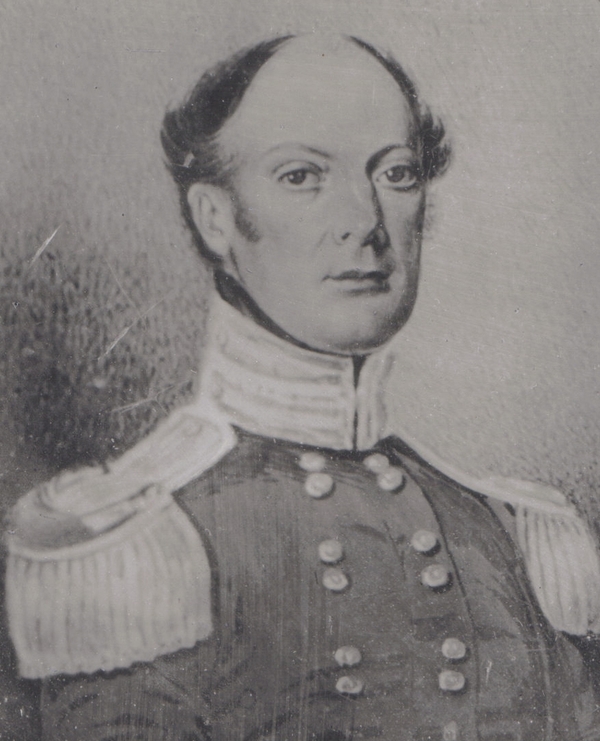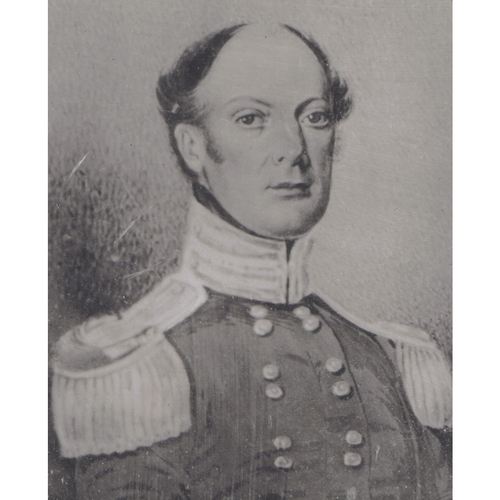
Source: Link
VanKOUGHNET, PHILIP (the name is often spelled Vankoughnet but he consistently used VanKoughnet), merchant and politician; b. probably 2 April 1790, at New Johnstown (Cornwall) in the district of Luneburg (later part of Upper Canada), son of Michael VanKoughnet, whose father was Alsatian, and Eve Empey, both loyalists; d. 7 May 1873.
Michael VanKoughnet was a large landowner and his son was educated at John Strachan*’s grammar school. With this background it is not surprising that Philip became an avid defender of the British connection. He served as a subaltern during the War of 1812 and was present at the battle of Crysler’s Farm where the advance of an American force on Cornwall was stopped. A quarter of a century later, in 1838, VanKoughnet, now a lieutenant-colonel, commanded a battalion of militia at the battle of the Windmill against the American invaders who sympathized with the Canadian rebels.
VanKoughnet began his political career at an early age. He was elected to the assembly of Upper Canada for the riding of Stormont and Russell in 1816 as a staunch defender of the colonial administration. He held one of the two seats of the county of Stormont from 1820 when they were created until 1828, and again from 1830 to 1834, and his friend Archibald McLean* held the second seat during the same period.
In 1836, two years after leaving the assembly, VanKoughnet, clearly a secondary member of the Family Compact, was appointed to the Legislative Council by Sir Francis Bond Head, no doubt on the recommendation of Sir John Colborne* whom Bond Head had just succeeded. One week after his commission as councillor, VanKoughnet preceded Colborne in a Cornwall procession and carried a standard inscribed “Sir John Colborne and the Constitution” to assert the town’s loyalty. He was not reappointed to the upper chamber after the union of 1841 and appears to have virtually retired from politics until 1857 when he re-emerged briefly. He contested the Cornwall seat unsuccessfully for the Conservatives when John Sandfield Macdonald switched his candidacy from Glengarry to the town. The Conservative efforts succeeded in keeping Macdonald tied to the local contest but VanKoughnet lost 428 to 246.
As a merchant and landowner, VanKoughnet was involved in several projects to improve transportation in the Cornwall area. In 1831 he was a member of a commission on roads and bridges in the township of Cornwall. Two years later he was one of the commissioners appointed to put into effect an act authorizing the financing and construction of the Cornwall Canal, begun in 1834 to improve navigation on the St Lawrence from Dickinson’s Landing to Cornwall, a distance of 11 ½ miles.
In 1833 VanKoughnet was appointed to the newly formed 5th division of the Cornwall and Roxborough Court of Requests as one of the 11 commissioners. He held this office until the court was abolished in 1841. In 1870, after a prolonged absence from public life, he was appointed chairman of the Canadian Board of Government Arbitrators, a position he still held at his death.
In 1819 he had married Harriet Sophia Scott of Carrick-on-Suir, Tipperary County, Ireland, who predeceased him. The most distinguished of their several children was Philip M. M. S. Vankoughnet*, who died in 1869.
Queen’s University Archives, Edmund Morris papers, “Colonel, the Hon. Philip Vankoughnet, M.L.C.” Armstrong, Handbook of Upper Canadian chronology, 27, 35, 64, 69, 70, 73, 75. B. W. Hodgins, “The political career of John Sandfield Macdonald to the fall of his administration in March 1864: a study in Canadian politics,” unpublished phd thesis, Duke University, 1964. J. F. Pringle, Lunenburgh or the old Eastern District, its settlement and early progress; with personal recollections of the town of Cornwall, from 1824 . . . (Cornwall, Ont., 1890), 34, 46, 66, 77–78, 155–62, 242, 260, 266–67.
Cite This Article
Bruce W. Hodgins, “VanKOUGHNET (Vankoughnet), PHILIP,” in Dictionary of Canadian Biography, vol. 10, University of Toronto/Université Laval, 2003–, accessed December 29, 2025, https://www.biographi.ca/en/bio/vankoughnet_philip_10E.html.
The citation above shows the format for footnotes and endnotes according to the Chicago manual of style (16th edition). Information to be used in other citation formats:
| Permalink: | https://www.biographi.ca/en/bio/vankoughnet_philip_10E.html |
| Author of Article: | Bruce W. Hodgins |
| Title of Article: | VanKOUGHNET (Vankoughnet), PHILIP |
| Publication Name: | Dictionary of Canadian Biography, vol. 10 |
| Publisher: | University of Toronto/Université Laval |
| Year of publication: | 1972 |
| Year of revision: | 1972 |
| Access Date: | December 29, 2025 |



